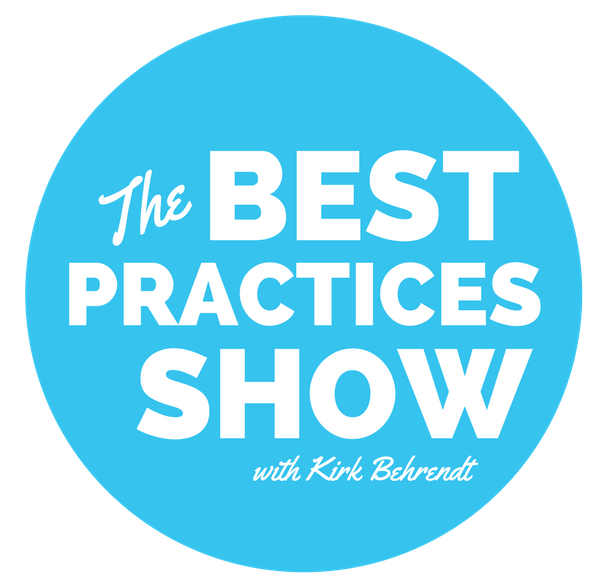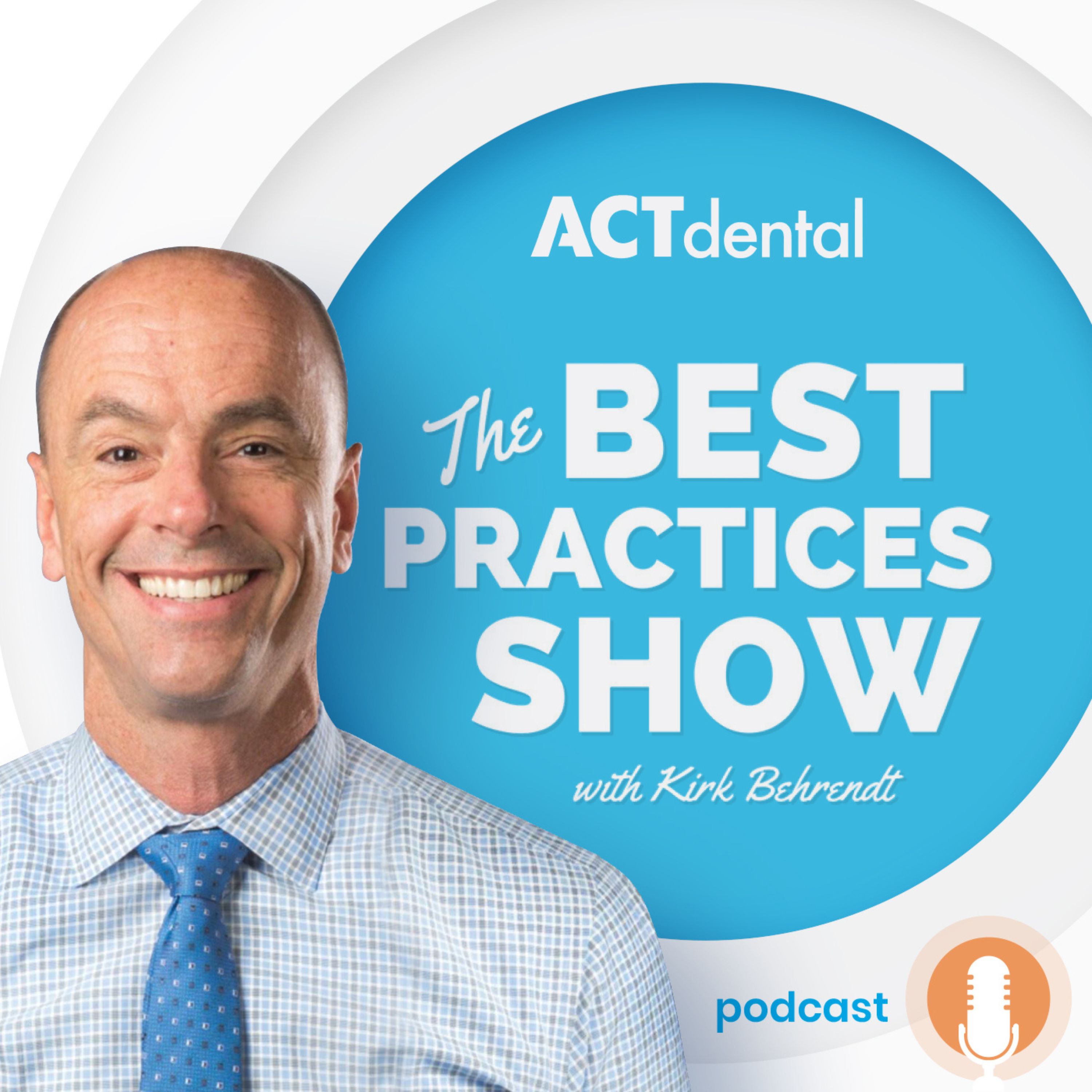Episode 352
352: Lessons from Unsuccessful Partnerships - Paul Sletten
Lessons from Unsuccessful Partnerships
Episode #352 with Paul Sletten
Not having a transition plan is like running laps with no finish line — it’s not fun, and you will plateau quickly. Whether you're looking to transition in the near or far future, today’s guest will help you get started. Kirk Behrendt brings in Paul Sletten from The Sletten Group to share the best planning advice so you can create successful partnerships and have seamless transitions. If you want to transition successfully, listen to Episode 352 of The Best Practices Show!
Main Takeaways:
A successful transition begins with having a plan.
Have a clear timetable for transitioning.
Transition plans are not one-size-fits-all. Don't use your colleagues’ plans.
A practice transition plan and the dentist’s life plan need to be connected.
Know what an ideal candidate profile looks like for a particular role.
Partnerships with family members require twice as much work.
For successful partnerships, commit to communicating well.
Quotes:
“Let's talk about unsuccessful transitions. The biggest reason, by far, is that they don't have a plan. When a practice owner wants to transition a practice, either by adding another dentist at an appropriate time or transitioning out of the practice, everything flows from the plan of the owner. So, if the owner is unsure of how to do it, when to do it, and those kinds of things, then the other doctor who’s under consideration for joining the practice can't make their plans either. So, it’s critically important that the owner have a plan. And so often, they're using their friends or their colleagues’ plan and contracts and haven't thought through their own issues.” (3:07—4:00)
“There's another thing that's really important. And that is, there needs to be a connection between their practice transition plan and their life plans. They have to be connected. They have to be congruent.” (4:01—4:13)
“A lot of times, they just kind of slap [transition plans] together. They meet somebody at a dental meeting, and the person makes a good impression and says, ‘You know, we ought to talk further.” And they do talk a little bit further. And the next thing you know, there's an invitation to come into the practice and get on a path to partnership, at some point. It’s just miraculous if something like that would work. Some do. But the vast majority don't.” (4:18—4:47)
“You have to have a timetable. How many people do we ask, ‘How much longer are you going to practice, and at what pace?’ And the typical answer is five years. And then, you talk to some of them five years later and you ask them the same question, and they say, ‘Five years,’ and so on. And so, what they're doing is they're just running laps with no finish line or no tape at the end. That's not fun. And then, the practice starts to go sour. It begins to plateau. And it can't sustain a plateau, so it begins to go into decline. And now, you're losing value for your practice.” (5:27—6:14)
“If somebody’s in a healthy financial condition, the seller, for example, at a closing table, you've got a really wonderful opportunity to put a win-win outcome together. If somebody comes to a closing table in a needy position, look out, buyer. Because they just absolutely need to sell it, but they also need to stick around and keep working. And that can raise other really nasty issues, because the patients need to start moving over to the new owner so they can pay the overhead expenses and begin to prosper, but they won't do so readily with the old owner in there.” (7:43—8:26)
“It’s so important to do the best match you can. For example, if you own a practice and you are in practice for 35 years and you're ready to transition, you and your team have been teaching your patients what to expect when they come to your practice for care for all 35 years. The new incoming dentist who will become the owner needs to know what those expectations are and what you've been teaching people to expect, because they're going to have the exact same expectations of the new dentist.” (10:40—11:19)
“I think there's a lot of influence peddlers in the dental profession right now, people in DSOs, who are pushing group practice and things like that. And then, the dentist finds out after they’ve sold the practice but are still in it that it’s not at all the way it used to be, and they really get stressed and unhappy.” (15:40—16:05)
“I think there are a lot of younger —and older — dentists who are saying, ‘Wouldn't it be nice if I didn't have to manage and lead and run the business and understand the business?’ And so, they just delegate that to someone else. And that doesn't work. It takes some of the burden away, but it adds other burdens. That's for certain.” (16:09—16:32)
“If you're a young dentist considering group practice, you need to be aware of something. If you have a four-doctor partnership, that practice is not managed or run by four doctors. There's almost always one doctor who emerges as the keeper of the flame and the visionary. And partnerships like that tend to work very, very well. If you had a management by committee, you'd never make any decisions. And you certainly wouldn't make many good decisions.” (18:37—19:18)
“What do you know about an ideal candidate profile when you're going to go out and hire somebody for a role or a position in the practice, starting with the doctor but including team members? What would an ideal candidate profile look like for that role that you need to put someone into? Start from there, and then really take some time to identify that so you're not just grabbing the next one who comes along.” (19:23—19:56)
“If a family member is going to be coming into a practice, it’s easy for them to say, ‘We don't need to do all the work prior to you coming onboard because we’re family. We know each other. We have the same values, and so we don't need to do all the work.’ The reality is that they need to do twice as much work because so much more is at risk, meaning the long-term relationships and so on.” (20:37—21:00)
“I'll give you an example of what can happen unless it’s addressed. So, a father brings in a daughter. At one point in time, he was father, she was daughter. Now, they're colleague and colleague, working together. They’re equal. As soon as conflict arises, father takes charge and takes over, and reverts to the old behavior he had in parenting, or daughter becomes the 12-year-old whiner and takes that role. And now, you're stuck. You've really got some problems.” (21:01—21:45)
“[When you have partnerships with family members], if you just put a good plan together and then get some outside help — sometimes, a psychologist or a therapist is required, in my opinion, to discuss certain issues. And then, other times, just addressing them with a third-party facilitator gets the job done as well.” (24:42—25:06)
“[For successful partnerships], a commitment to really communicating well with each other is a place to begin.” (26:46—26:51)
“When you're interviewing and vetting candidates, you really need to get to know them. I like to know all about their personal background. I like to know about their family. I like to know about the community they grew up in. If a practice owner has a really strong work ethic and a lot of drive and fire in the belly and everything else, the incoming doctor has to mirror those things. They don't have to be a clone of that doctor, not by any means. But they have to have those qualities, and they have to be good at relationships, and they have to want to learn about the business.” (27:45—28:27)
“We all encounter people who tease us with their potential. What I mean by that is, they are just magnificent on their good days — they just don't have that many of them. And so, you get into a situation with a person like that, and I've been there, where you begin to care much more about them being successful than they do. And that's a dead-end street. You're not going to win that one. So, there are things that you have to notice in that regard as well.” (30:23—30:55)
Snippets:
0:00 Introduction.
0:42 Paul’s background.
1:59 Reasons for unsuccessful transitions.
6:19 Selling in a healthy versus unhealthy financial condition.
8:26 How to make transitions work.
11:37 Partnerships are more complex than marriage.
14:19 Things to know about group practice.
18:27 Other things to know about group practice.
19:56 What to know about partnerships with family members.
22:12 Hire an outside expert.
25:32 Successful partnerships and signals of success.
26:51 How to do an elegant handoff to the ideal candidate.
28:52 Candidates can tease you with their potential.
31:22 Basics on talking money with partners.
32:57 How Paul can help you.
35:39 Paul’s contact information.
Reach Out to Paul:
Paul’s website: https://theslettengroup.com/
Paul’s cell phone number: (303) 902-9953
Paul’s Facebook: https://www.facebook.com/paul.sletten.3
Paul Sletten Bio:
Paul D. Sletten founded The Sletten Group, Inc. in 1975 in Denver, Colorado. We are now celebrating our 35th anniversary! We continue to exclusively work with fee-for-service dentists and their teams around the country.
The Sletten Group, Inc. was originally founded as Paul Sletten and Associates, Inc. The primary focus of the business in 1975 was offering practice management services. The focus was to teach dentists how to operate their dental practices as a business. We helped clients become effective managers and leaders. By the end of the 1970s, we began helping dentists place values on their practices, and offered services for creating successful transitions.
We have a large number of clients who have been working with us for over 20 years and still have future dental practice transition events on the horizon. It is exciting to see both people and practices grow, and to know we have had a hand in it.
The Sletten Group has developed an international clientele. We have worked with clients in 46 states in the U.S., four provinces in Canada, and in two states in Australia. Our wide-ranging experiences allow us to bring what we have learned to each new client situation. It helps us know how to tailor our services to the unique needs of each client and to be able to offer multiple options to almost any client fact situation.
Paul has spoken at more than 200 dental meetings around the country. This includes almost all of the major dental meetings and numerous study clubs. The topics focus on all aspects of Practice Transitions — including buying a dental practice, selling a dental practice, and much more — as well as personal growth and development for dentists and team members.
Ruth Sletten and Pam Sletten work in the business and are very involved in helping our clients. They all make very important contributions to our clients and to the success of our business.
The next decade will be full of more opportunities and will require that we change with the needs of the profession and our clients. We continue to expand our range of services for young dentists and prospective buyers. We help them evaluate practice opportunities and set a proper course for their professional lives. All of us at The Sletten Group continue to focus on our own personal growth each year. We come to the world with a sense of wonder and are constantly on a quest to learn more and apply that learning to the benefit of our clients.


